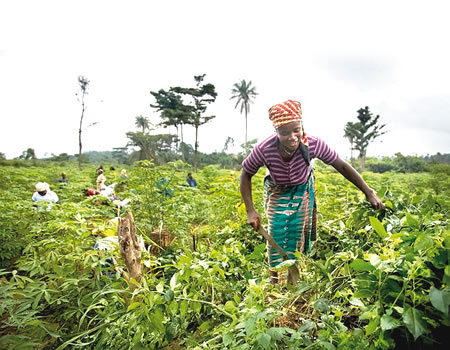Despite the apparent significance of education for all, a lot of school aged girls in Gombe State are out of school, resorting to engaging in farm labour for tokens.
LEADERSHIP reports that these girls are subjected to hard labour in the farms which do not belong to their parents but to strangers, exposing them to other dangers.
It is observed that during rainy seasons, plenty of teenage girls troop to various streets of towns in the state including the capital city, Gombe, looking for farmers that will hire their labour and take them to farm to work. This labour which includes; farms clearing, ploughing, planting, weeding, fertilising and harvesting is popularly known as “barema”.
Stakeholders have deplored the practice of barema especially among the girls saying it leaves the girls without education and subjects them to exploitation and rape.
The state governor, Inuwa Yahaya, has also confessed that there are thousand girls on the streets who can be taken for labour in the state but that he was willing to address the menace. He made the confession in one of his public functions in recent time where he mentioned the most prevalent areas to include; Bojude, Kwami and Dukku towns.
However, finding by our reporter showed that there was no pragmatic steps and drastic actions taken by the government to surmount the problem.
Stakeholders also uncovered that lack of a comprehensive and gender responsive education sector plan in the state, and poverty are the major factors leaving girls out of schools and forcing them to go to farms.
The state chairman of the Nigerian Union of Teachers (NUT), Ali Baba Dalhatu, said as teachers, they are worried by the prevalence of farm labour among girls in the state which affects their attendance in schools.
He said: “Absolutely, it is a serious issue that worries not only NUT but parents, government. But economic hardship leads to such kind of situation.”
He revealed that number of girls drop in schools during rainy seasons due to barema practice.
Also responding, the President, All Nigerian Confederation of Principals (ANCOPS), Gombe State chapter, Abubakar Sadiq Suleiman, corroborated the position of the NUT chairman pointing out that girls’ attendance in schools during rainy season is “very low”.
Director planning and statistics of the state ministry of education, Abdulmuminu Umar Kwami, revealed that the enrolment of girls in primary schools in the state is estimated to be 44.6 per cent and 41.5 per cent in junior secondary school, which imply that more than half of the state’s school aged girls are out of schools.
He further revealed that the figure declines to 38.5 per cent in senior secondary schools instead of increasing or maintaining the statu.
Executive director of a non governmental organisation known as ‘ADDA Girl Education Foundation’, Abubakar Abdullahi Hussain, said farm labour by the girls in the state is related to the economy as the girls are breadwinners in their family.
He called for free education to the girl child in the state from primary to secondary school in its education sector plan as part of measures to tackle barema practice among girls.
In his submission, the chairman Gombe State Network of Civil Society Organisations, an umbrella body of all CSOs in the state, Ibrahim Yusuf, attributed the problem to system failure fearing that the phenomenon is a time bomb in Gombe State that is also bedeviled by the almajiri problem, the out of schools children and the issue of girls going to farm for barema.
He opined that women in decision making level in the state are not representing the girl child.
“The only thing that will change this narrative is radical approach and proactive measures, engaging all stakeholders from the family, that is the heads of the families, the traditional or community gate keepers, religious and community based organisations.
“Let them know that this issue of girl child going to farm is endangering their lives and future of their families. Why because anything can happen. All or most of them are sexually active. They are being abused whether willingly or intentionally or by bullying them.
“If that thing needs to be changed, everybody needs to be carried along especially from the community level. Let the community own the entire process in driving the narrative change.
“Is not only about policy, is about engagement, let government engage everybody, let them understand the gravity of the future of our unborn children especially in the rural community.”, he stated.
The stakeholders alleged that in some of the communities; over 40 girls were impregnated as a result of the barema practice as farmers who hire them to work also have sex with them in the farms.
However, some parents interviewed in Wuro Bobbo community of Akko Local Government Area whose girls go to farm, disclosed that they allow the girls to do the farm labour in order to save money for their marriage.
When contacted, the state Project Coordinator (PC) of Adolescents Girls Initiative for Learning and Empowerment (AGILE), Dr Amina Haruna Abdul, who said AGILE is a project of the state government supported by the World Bank to improve secondary education opportunities for girls between the ages of 10 and 20, promised that the project intends to provide new junior and senior secondary schools in communities that have primary schools with a significant number of girls, to ensure secondary education is accessible within their communities.
Amina lamented the increasing number of girls engaging in farm labour in the state, “leaving home in the morning and returning in the night” for a meager sum of money as reward.
She revealed that some of the girls collect N500 after working from morning to night on farms.
“When you come to north east, Gombe is the first on the list of children roaming the streets. We call them out of schools girls. If you consider Gombe in five to six years back, you don’t see this situation at all. So you begin to wonder what is happening? We are having more and more girls on the streets.”, she decried.
The AGILE coordinator added that they would offer a second chance education, providing training, materials, and registration for out-of-school girls to acquire skills and education, encouraging them to quit farm labour.
She promised that scholarships would be awarded to the poorest girls, utilising YESSO’s poverty rankings to enroll out-of-school girls in the state.





